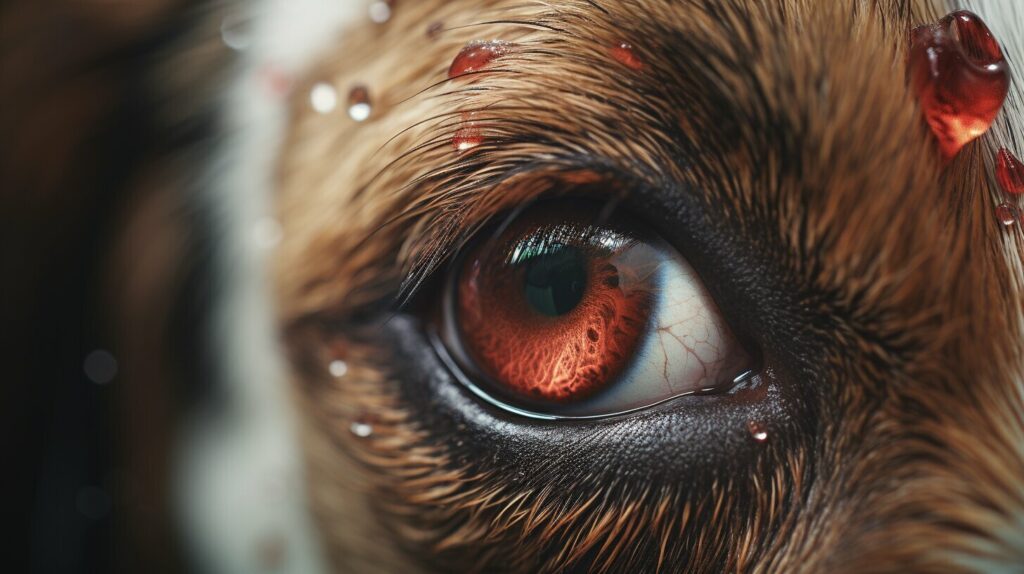If you are a dog owner, you know that your furry friend’s health is a top priority. Unfortunately, dogs can get eye infections just like humans, and it is essential to recognize the signs and seek prompt treatment to prevent any complications.
In this section, we will discuss how to identify an eye infection in dogs, potential causes, and treatment options, so you can take the necessary steps to keep your furry companion healthy and happy.
Key Takeaways:
- Eye infections are common in dogs and require prompt treatment.
- Recognizing the signs of an eye infection is crucial for timely treatment.
- Possible causes of eye infections in dogs include bacteria, viruses, allergies, foreign bodies, and underlying health conditions.
- Treatment options for eye infections in dogs include topical ointments, oral medications, and home remedies.
Common Symptoms of Eye Infections in Dogs
If your furry friend is experiencing any of the following dog eye problems, it may indicate an eye infection:
- Redness or irritation
- Discharge from the eye
- Swelling or puffiness around the eye
- Excessive blinking or squinting
- Cloudy or hazy appearance of the eye
- Changes in the color of the iris
- Scratching or rubbing the eye
- Crusty or sticky discharge around the eye
Conjunctivitis is a common type of dog eye infection that causes inflammation of the conjunctiva, or the tissue that lines the inner eyelid and the whites of the eye. Eyelid infections can also occur, causing redness, swelling, or discharge around the eyelids.
If you notice any of these symptoms in your dog’s eye, it’s important to seek veterinary assistance promptly. Early detection and treatment can help prevent complications and ensure a quicker recovery.
Causes of Eye Infections in Dogs
Just like humans, dogs can develop eye infections for a variety of reasons. Understanding the causes of eye infections in dogs is crucial for effective treatment and prevention. Here are some common causes of eye infections in dogs:
| Cause | Description |
|---|---|
| Bacteria | Bacteria, such as staphylococcus and streptococcus, are common culprits of dog eye infections. |
| Virus | Viruses, including canine distemper and herpesvirus, can also cause eye infections in dogs. |
| Allergies | Dogs can develop eye infections as a result of allergies to environmental factors, such as pollen, dust, and mold. |
| Foreign Bodies | Foreign objects, such as dust, debris, and plant material, can get into a dog’s eye and cause an infection. |
| Underlying Health Conditions | Eye infections can also be a symptom of underlying health conditions, such as an immune system disorder or a hormonal imbalance. |
If you suspect your dog has an eye infection, it is essential to consult with your veterinarian for a proper diagnosis and treatment plan. Your vet may conduct a physical examination and may also perform tests to determine the underlying cause of the infection.
Diagnosing an Eye Infection in Dogs
If you suspect your dog is suffering from an eye infection, it’s essential to consult with a veterinarian for a proper diagnosis. Your veterinarian will conduct an eye examination to determine the severity of the infection and potential causes.
The diagnostic process for eye infections in dogs involves several steps. Firstly, the veterinarian will examine the dog’s eyes for any signs of inflammation, discharge, redness, or swelling. They may also use a special dye to detect any abrasions or foreign objects on the eye’s surface.
If necessary, your veterinarian may also conduct additional tests to identify the underlying cause of the infection. This may include taking a swab from the eye to check for bacterial or fungal infections or performing a blood test to rule out any underlying health conditions.
It’s crucial to seek veterinary assistance promptly if you notice any signs of an eye infection in your dog. Delaying treatment can result in the infection spreading and potentially causing permanent eye damage.
Treating an Eye Infection in Dogs
If you suspect that your dog has an eye infection, it is essential to seek veterinary attention promptly. Your vet will be able to diagnose the type of infection and determine the appropriate treatment plan. The following are the most common methods of treating eye infections in dogs:
Topical Ointments
Topical ointments, such as antibiotics or corticosteroids, are often prescribed to help clear up eye infections in dogs. These ointments are typically applied directly to the affected eye several times a day for about a week. Be sure to follow the instructions carefully and avoid touching the tip of the applicator to prevent contamination.
Oral Medications
In more severe cases, your veterinarian may prescribe oral antibiotics in addition to topical ointments. These medications can help fight the infection from the inside out and may be necessary if the infection has spread beyond the eye.
Home Care Remedies
In addition to prescribed medication, there are several home care remedies that may help soothe your dog’s eye infection. Warm compresses applied to the affected eye can help reduce inflammation and encourage drainage. You can also use herbal eye rinses, such as chamomile tea, which has natural anti-inflammatory and antibacterial properties.
Remember, never attempt to treat your dog’s eye infection with home remedies alone without consulting your veterinarian first. Some remedies may worsen the infection or cause further damage to the eye. Always follow your vet’s advice and treatment plan for the best results.
Preventing Eye Infections in Dogs
Prevention is always better than cure when it comes to eye infections in dogs. By taking some simple precautions, you can reduce the risk of your furry friend developing a canine eye infection.
Cleanliness is Key
Regular cleaning is essential to keep your dog’s eyes healthy. Use a clean, damp cloth or cotton pad to wipe away any secretions or debris that may accumulate around the eyes. Be gentle and avoid touching the eye itself, as this can cause further irritation. If you notice any discharge or crust around the eyes, make sure to clean it right away.
Avoid Irritants
Chemicals, smoke, and other irritants can cause eye infections in dogs. Keep your pet away from tobacco smoke, cleaning products, and other harsh chemicals. If you use any products that may irritate your dog’s eyes, make sure to rinse them thoroughly afterward to prevent any lingering residue from harming your pet.
Maintain Overall Health
Good health is essential for preventing eye infections in dogs. Make sure your pet has a balanced diet, regular exercise, and all the necessary vaccinations to help keep them healthy. If your dog has any underlying health issues, make sure to follow your veterinarian’s recommendations to manage them effectively.
- Feed your dog a balanced diet
- Make sure your pet gets enough exercise
- Keep up with regular vet check-ups
- Follow your vet’s advice on vaccinations and parasite control
By following these tips, you can help keep your dog’s eyes healthy and reduce the risk of canine eye infections. If you notice any signs of an eye infection in your pet, seek veterinary assistance right away.
When to Seek Veterinary Assistance
If you notice any symptoms of an eye infection in your dog, it is crucial to seek veterinary assistance promptly. While some mild cases may improve with home care remedies, others may require medical treatment to prevent complications.
If your dog experiences severe symptoms, such as extreme redness, swelling, or discharge, or if there is no improvement with home care after a few days, consult your veterinarian immediately. Additionally, if your dog has an underlying health condition that may affect their eye health, it is essential to monitor their eye health regularly and report any changes to your veterinarian.
Remember, timely intervention and appropriate treatment can help prevent further damage to your dog’s eyes and maintain their overall well-being.
Home Remedies for Soothing Dog’s Eye Infections
If your dog has an eye infection, home remedies can help soothe the symptoms and support the healing process. However, it’s important to note that home remedies should not replace professional veterinary care.
Warm Compresses
Applying a warm compress to your dog’s eye can help reduce inflammation, relieve itching, and increase blood flow to the affected area. To make a warm compress, soak a clean cloth in warm water and wring out the excess moisture. Gently press the compress against your dog’s eye for 5-10 minutes, being careful not to apply too much pressure. Repeat this process 2-3 times a day until symptoms improve.
Herbal Eye Rinses
Some herbs have natural anti-inflammatory and antimicrobial properties that can help treat your dog’s eye infection. Chamomile tea and green tea are both effective choices for an herbal eye rinse. Brew a cup of tea using a teabag or loose leaves, let it cool, and then use a dropper or sterile cotton ball to apply the tea to your dog’s eye. Repeat this process several times a day until symptoms improve.
When to Avoid Home Remedies
While home remedies can provide relief for mild eye infections, certain symptoms may indicate a more serious condition that requires professional veterinary care. If your dog has severe symptoms such as intense pain, excessive discharge, or changes in vision, seek veterinary assistance immediately. Additionally, if your dog’s symptoms do not improve after a few days of home care, it’s important to consult with a veterinarian to rule out underlying health conditions.
By following these home care remedies, you can help ease your dog’s discomfort and support the healing process of their eye infection. Pairing these remedies with professional veterinary care can help ensure a speedy recovery and prevent further complications.
Tips for Maintaining Eye Health in Dogs
As a responsible dog owner, it’s crucial to take proactive measures to maintain your pet’s eye health. Here are some useful tips:
1. Schedule Regular Check-Ups
Annual or bi-annual visits to the veterinarian are essential in preventing and detecting eye infections and other health issues in your dog. During these check-ups, the vet will conduct a thorough examination of your pet’s eyes to ensure they are healthy.
2. Practice Proper Grooming
Regular grooming helps to keep your dog’s eyes clean, reducing the risk of irritation and infection. Trim the hair around your dog’s eyes to prevent it from rubbing against the eyes and causing irritation. Be sure to also clean your dog’s face and remove any discharge or debris around the eyes with a damp cloth.
3. Avoid Potential Eye Irritants
Dogs can be sensitive to certain chemicals and allergens that may cause eye irritation and infection. Keep your dog away from cigarette smoke, cleaning products, and other potential irritants. Additionally, avoid using human eye drops or ointments on your dog’s eyes without consulting a veterinarian.
4. Provide Proper Nutrition
Good nutrition is essential for maintaining your dog’s overall health and immune system, which can help prevent eye infections. Ensure your dog’s diet includes essential vitamins and nutrients, such as vitamin A and omega-3 fatty acids. Be sure to consult your vet before making any significant changes to your dog’s diet.
5. Pay Attention to Any Changes in Eye Appearance or Behavior
If you notice any changes in your dog’s eye appearance, such as redness, swelling, or discharge, or if your pet seems to be rubbing or scratching their eyes excessively, it’s essential to seek veterinary assistance promptly. Early detection and treatment can prevent the infection from spreading and causing more severe health issues.
By following these tips, you can help keep your dog’s eyes healthy and prevent eye infections and other health issues.
Conclusion
As a responsible dog owner, it is essential to be vigilant and observant when it comes to your furry friend’s eye health. Eye infections can be painful and potentially lead to serious complications, making it crucial to recognize the symptoms and seek prompt veterinary care.
By following the necessary steps to treat and prevent eye infections in dogs, you can minimize the risk of your pet experiencing discomfort and vision problems. Remember to maintain proper grooming, avoid possible irritants, and seek veterinary assistance when needed.
Takeaway
Regular eye examinations and proper care can help keep your dog’s eyes healthy and prevent the onset of infections. By staying informed and taking proactive measures to maintain your pet’s eye health, you can enjoy a long and fulfilling life together.
FAQ
Q: How can I recognize if my dog has an eye infection?
A: Some common signs of an eye infection in dogs include redness, discharge, swelling, and excessive blinking or squinting.
Q: What are the causes of eye infections in dogs?
A: Eye infections in dogs can be caused by bacteria, viruses, allergies, foreign bodies, and underlying health conditions.
Q: When should I seek veterinary assistance for my dog’s eye infection?
A: It is important to seek veterinary assistance if your dog’s eye infection is severe, if there is no improvement with home care, or if your dog has underlying health conditions.
Q: How can I treat my dog’s eye infection?
A: Treatment options for dog eye infections include topical ointments, oral medications, and home care remedies such as warm compresses and herbal eye rinses.
Q: What are some tips for maintaining my dog’s eye health?
A: Regular check-ups, proper grooming, and avoiding potential eye irritants can help maintain your dog’s eye health.



